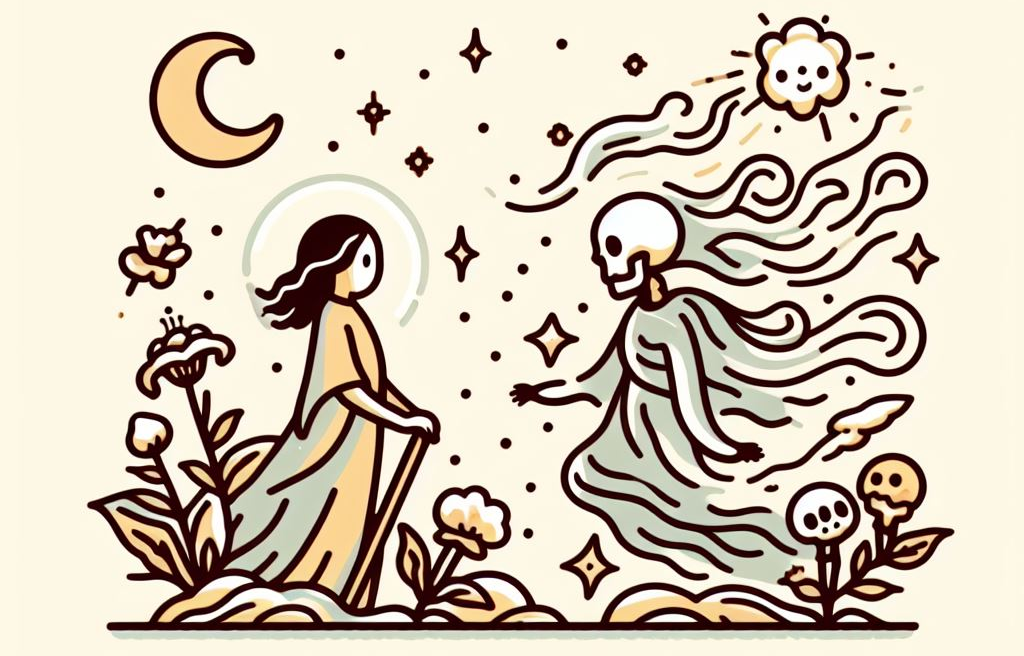Death & Legacy: A Call to Action
 ⏲ 3-minute read | Photo by DALL·E 3 "Ephemerality of Life" | last updated 1 year, 1 month ago
⏲ 3-minute read | Photo by DALL·E 3 "Ephemerality of Life" | last updated 1 year, 1 month ago
Time is our most precious resource. We should remember that, and not treat it so carelessly. Throughout our lives, we're intermittently reminded of this fact, but afraid to talk about it.
We're uncomfortable talking about death because in the age of knowledge, it’s the last unknown. “Death, the great equalizer”.
Death is a fundamental human experience, and confrontation with it yields as many unique cultural traditions as there are cultures. They’re societal coping mechanisms for the unknown, each learned differently. For me, the most resonant is the stoic philosophy of memento mori (Latin for remember death).
Death Gives Us Perspective for Life
Core to memento mori is the frequent reflection of life’s ephemerality, and death. This may sound morose, but the intention here is the opposite - to become obsessed with life. Through a constant self-reminder about death’s inevitability, we're encouraged to prioritize good living.
We forget to live well because we waste our time. We naturally squander the time we’re given. Give an hour for a task, and the task takes that long. Two hours? It'll take that long too. In business it's a phenomenon called Parkinsons Law. In life it's an implicit expectation borne to us by the nearly 100 years of life we each assume we'll be granted. Memento mori confronts this with the most basic call to action: make meaning of our time, for we know not how much we have left1.
80,000 Hours and 5,200 Weeks
That’s (roughly) how much time we’ll spend working in our careers and how long we have to live. It begs the question: what type of legacy will we leave?
So do meaningful work, take a vacation, make time for our friends, and connect with our family (and maybe launch that business, do the presentation, don’t stress over that email, and volunteer for that thing outside our comfort zone). Time is a strange thing, and we only get a sliver.
Connections Don’t End When You Die
What is death when compared to a meaningless existence? Or put more succinctly, if a tree falls in the forest and no one is around to hear it, does it make a sound? Give your loved ones a reason to remember; because relationships don’t end when you die, they just change.
Most relationships consist of time spent by ourselves, with a sprinkling of engagement with another. Like a plant, we'll occasionally water it, prune it, and (hopefully) enjoy it - but we don't spend all our time with it. The same goes for human connections - it's mostly time spent not with someone. Relationships, then, are the influence we have on one another.
When we die, we no longer have an opportunity to impact others directly; it’s only those touched by our actions (what we did and how we made them feel) that our legacy echoes through time. Death solidifies the trajectory of the relationship, but the relationship remains2.
Some echoes die quickly: muted, faded, and muffled by a meaningless existence. Others are profound, crisp, sharp reverberations.
And a special few3 have lives so rich and actions so meaningful, their echos carry vast distances...resonating so loud that at times, it approaches a feeling as though they’re still there, standing alongside you.
Be the person whose echo carries for generations; and in moments of sorrow for those no longer with us: listen closely, as the special ones are never too far.
--
Enjoyed? Subscribe. Comments? Send me a message.
It’s this reason why near-death experiences are so profound.↩
Don't believe me? Ask the millions of practicing Christians who have a relationship with Jesus, and that guy died 2,000 years ago!↩
Here’s in loving memory of you: Sylvia Brennan, Susan Kuzia, Liz Kuzia, and Randy Greeson. I still hear you, loud and clear.↩